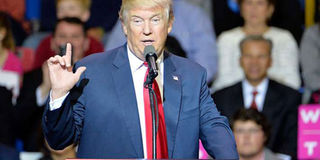Politicians are busy exploiting the radicalism sweeping all the world

President-elect Donald Trump addresses an audience at Crown Coliseum on December 6, 2016 in Fayetteville, North Carolina. PHOTO | AFP
What you need to know:
- It is heartening to see the resilience and determination of people who refuse to be cowed despite tremendous challenges and threats.
- Indonesia is predominately Muslim, and is the largest Muslim democracy in the world.
There is a serious thread of fundamentalism and intolerance that is sweeping across the world.
And devious politicians are muddying the waters, exploiting fears and fundamentalisms, in order to get or maintain power.
This is not just about the Trumps and Brexits of this world: this is a phenomenon that is current in Africa and Asia.
The Western press has been obsessing on these trends since Brexit and Trump.
And that is understandable for in Europe and USA, there has been an almost unbroken trajectory towards more openness and more democracy since the end of the Second World War.
This trajectory was further cemented by the end of the Cold War, which is, ironically, perhaps the biggest reason for the enormous chasm between the one per cent of the world who own as much as the rest of us 99 per cent.
The end of the Cold War allowed free market fundamentalists to shake off regulations, trade union checks and tax regimes that had been put in place to ensure more equity so that conditions were not conducive for “socialist” revolutions like the 1917 Russian one.
But by removing these regulations, by weakening and destroying trade unions, and by changing tax regimes to favour the rich over the middle class and the poor, the frustrations in the west have led to insecurities and anger against the “mainstream”, coupled with a focus on identity and exclusion.
I am writing this from Indonesia as part of a trip to various Asian countries meeting with activists.
EPITOME OF DEMOCRACY
It is heartening to see the resilience and determination of people who refuse to be cowed despite tremendous challenges and threats.
There are few ways better to engender hope than to meet Thai villagers who refuse to surrender their lands to mining companies despite the odds against them.
Or the farmers in Indonesia who keep standing up against oil palm plantation owners whose use of chemicals have harmed them.
Or the black people of West Papua, who live in a situation akin to colonial rule who are organising daily, despite killings and jail, to achieve freedom and status worthy of first class citizens.
What is clear is that like in Africa and Kenya, fundamentalist exclusionary politics have been around for a while here.
It is not that long ago when Pol Pot and his killer Khmer Rouge regime eliminated at least three million people in Cambodia, in addition to outlawing schools, hospitals and money.
Everyone was evacuated to the rural areas to work on rice fields, and was clothed and fed by the regime directly.
And in Indonesia, the wounds of the 1965 tragedy when General Suharto — with the support of the West — toppled President Sukarno remain open to the thousands of victims and their families.
They have not forgotten the terrible atrocities committed against them, simply because they were thought to be communists, socialists or nationalists.
Suharto marshalled Islamist forces into an alliance with the military as a counter to nationalist, secular and socialist supporters.
Indonesia is predominately Muslim, and is the largest Muslim democracy in the world.
There have been five different presidents since 1998 with different parties gaining and losing power peacefully, which is one of the hallmarks of a democracy.
TROUBLING THOUGHT
It has come a long way since the Suharto dictatorship and is viewed as the country with the brightest hope in the sub-region.
But Islamist ideology is back and seemingly supported by the security sector.
For instance, whenever the 65ers (as the survivors of 1965 are called) attempt to gather to pursue their interests, youths affiliated to a fundamentalist and militant Islamic movement, appear and disrupt their gatherings.
And these gatherings could be about pushing for remembrance of the past, pushing for accountability or even to ask for health care given the advanced age of the remaining survivors.
Religious minorities are also under siege with demands that they should follow the dictates of the majority.
The notion that the majority can decide for everyone is worrying.
But it is also short-sighted: for every majority in one place is a minority in another place, but somehow this escapes majorities who then cry foul when the same things they do to their minorities are done to them.





